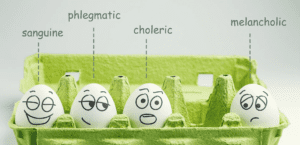
What is the Phlegmatic Personality Temperament?

The Phlegmatic Personality Temperament is known as the Watcher/Dependent Temperament.
- They are very caring and have deep relationships, but usually only a couple of close friends.
- They want to be loved by everyone and look for appreciation.
- They work best in a limited situation with a steady work pattern.
- They don’t like significant changes.
The Phlegmatic Temperament is almost the opposite of the Sanguine Temperament Type. However, having Sanguine as your Primary Type and Phlegmatic as your Secondary Type is possible, and vice versa.
Phlegmatic personalities are known to be people-oriented and are seen as neutral (or ambiverts).
They seek interpersonal harmony and wholesome relationships, and being easygoing and warmly attentive makes them likable.
If you identify as a Phlegmatic person, you are diplomatic and understanding, as your nature is more likely to avoid conflicts. Your peaceful and rational nature can help keep others calm, collected, and stable. Because they value friendships and bonding, they try to mediate between others to restore balance.
They are not particularly keen on change, but their nature to strive for knowledge and contribute to the bigger picture motivates them to move forward.
Phlegmatic Temperament Personality Type cross-reference
- Keirsey Type – Idealists
- Animal Type – Otter
- DISC Type – Influential
- Socio-Communicative Type – Expressive
- True Colors – Blue
- Color Code – Blue
- Personality Compass – West
- Occupational Type – Artistic
- Learning Type – Theorist
- Leadership Type – Collaborator
MBTI Personality Type (xNFx) – Intuition and Feeling
Enneagram Types
- Type 1 – The Reformer (ENFJ, INFJ)
- Type 4 – The Individualist (INFJ, INFP)
- Type 7 – The Enthusiast (ENFP)
- Type 9 – The Peacemaker (INFP)
Phlegmatic Temperament Strengths
- They are very accommodating.
- They tend to be calm and affirming.
- They are the watchers.
- They are good at making friends and are very loyal.
Phlegmatic Temperament Weaknesses
- They can be indecisive and indifferent.
- They have difficulty expressing emotions.
- They tend to be too soft on other people.
- They look for security and can be very sensitive.
Phlegmatic Temperament Limitations
- They see the need to be more assertive.
- They hold others accountable.
Phlegmatic Temperament Orientation
- People with the phlegmatic temperament type are service-oriented.
- They are introverted but will frequently work together with others to achieve a common goal.
- They are passive, leading to a lack of ambition or urgency, even when working with others.
Phlegmatic Temperament Traits
The passiveness of the Phlegmatic Temperament Type leads to a distinct set of characteristics.
- They are easygoing, calm, and unemotional.
- They can be indecisive and agreeable and are usually happy to allow others to make decisions.
Phlegmatic people slowly warm up to others but will make friends fairly quickly.
- They are one of the most accessible Temperament Types to get along with because they are agreeable and patient.
- However, they stick closely to their routines and resist change.
Phlegmatic people tend to live quiet lives around the home and with family.
- They don’t get involved in the world around them or with other people.
- However, they are fiercely loyal to their friends and will stick to a relationship regardless of what the other person does or says.
- However, once a relationship does break, they are not likely to return to it.
Phlegmatic people are content to let things happen.
- They are not quick to make decisions and are not ambitious.
- However, they resist change.
- They may need a lot of time and patience to adapt to change, especially if it is sudden.
Phlegmatic Temperament Careers
Personality Temperaments, Traits, and Types
Personality Temperaments, Personality Traits, and Personality Types are used in Psychology to discuss a person’s Personality, a collection of Emotions, Perceptions, and Actions that interact with each other, regulate themselves, and shape a dynamic system that forms a person’s Behavioral Patterns.
Your inherited traits (your personality Temperance) and acquired traits (such as education, socialization, and other various pressures and aspects) form your Personality.
A Personality Type identifies a specific collection of Traits, both learned and natural, that comprise a broad, general Personality Classification—a way of labeling a collection of traits and behaviors.
A Personality Trait remains consistent and stable over time, which means you exhibit the same pattern across different situations and throughout your life.
Three criteria characterize Personality Traits: (1) consistency, (2) stability, and (3) individual differences. For example, if you are talkative at home, you also tend to be talkative at work. And if you were talkative at age 20, you would still be chatty at age 40.
Personality Temperament is your “Naturally Intuitive” biological Trait. These Traits are partly inherited from your genes and partially determined by your brainstem, which doesn’t change throughout your life. These are Natural Traits regarded as innate or inborn and not learned.
Your Personality Temperament is formed as an infant and is hard to modify, manipulate, or change because it is genetic. In some way or another, your inherited behavioral tendency will always be there.
Personality Traits are quantitative differences between people, and Personality Types are qualitative differences between people. The most crucial difference between the Trait Theory and the Type Theory is that the Type Theory views people’s characteristics as discrete categories, while the Trait Theory views these characteristics as a continuum.
For example, while a Type Theorist would claim that introverts and extraverts are two types of people, a Trait Theorist claims that extraversion is a gradient, and individuals can fall somewhere in the middle.
Your Temperaments, along with acquired Traits, form your Personality.



